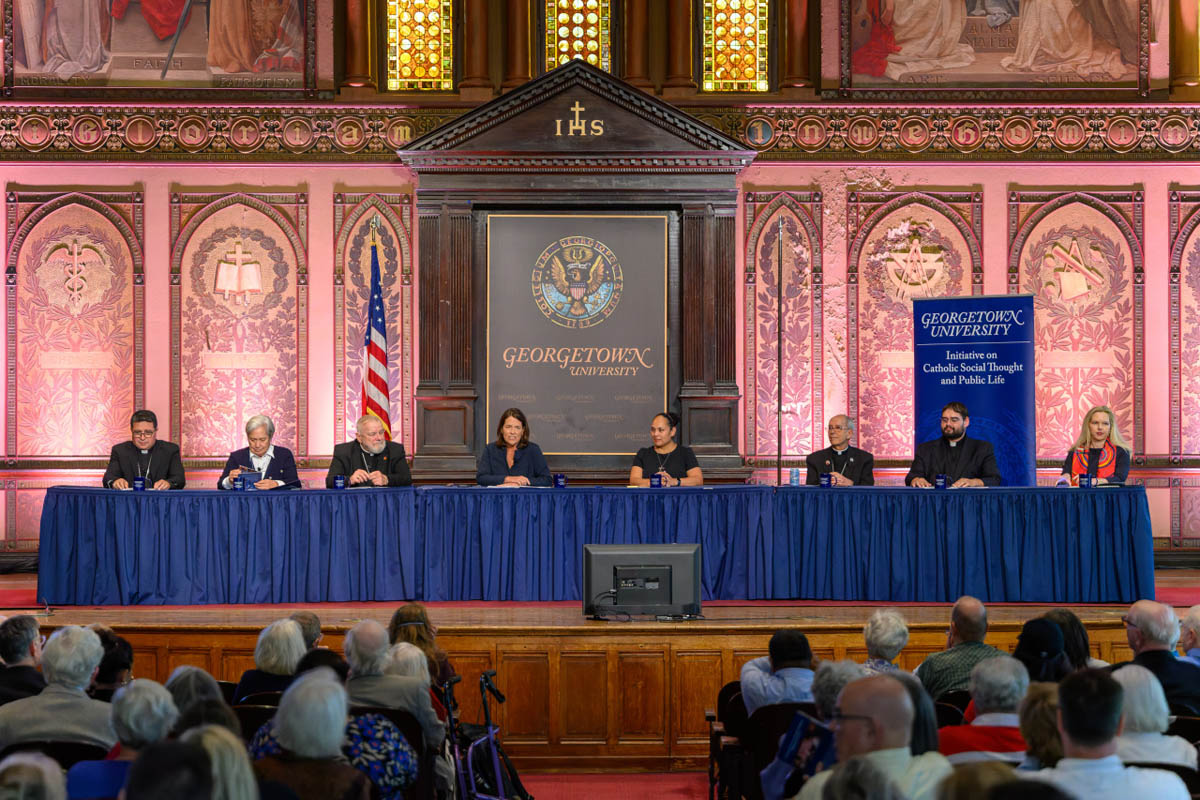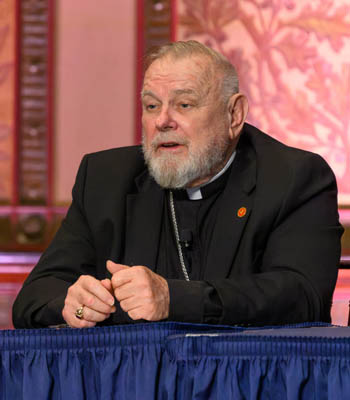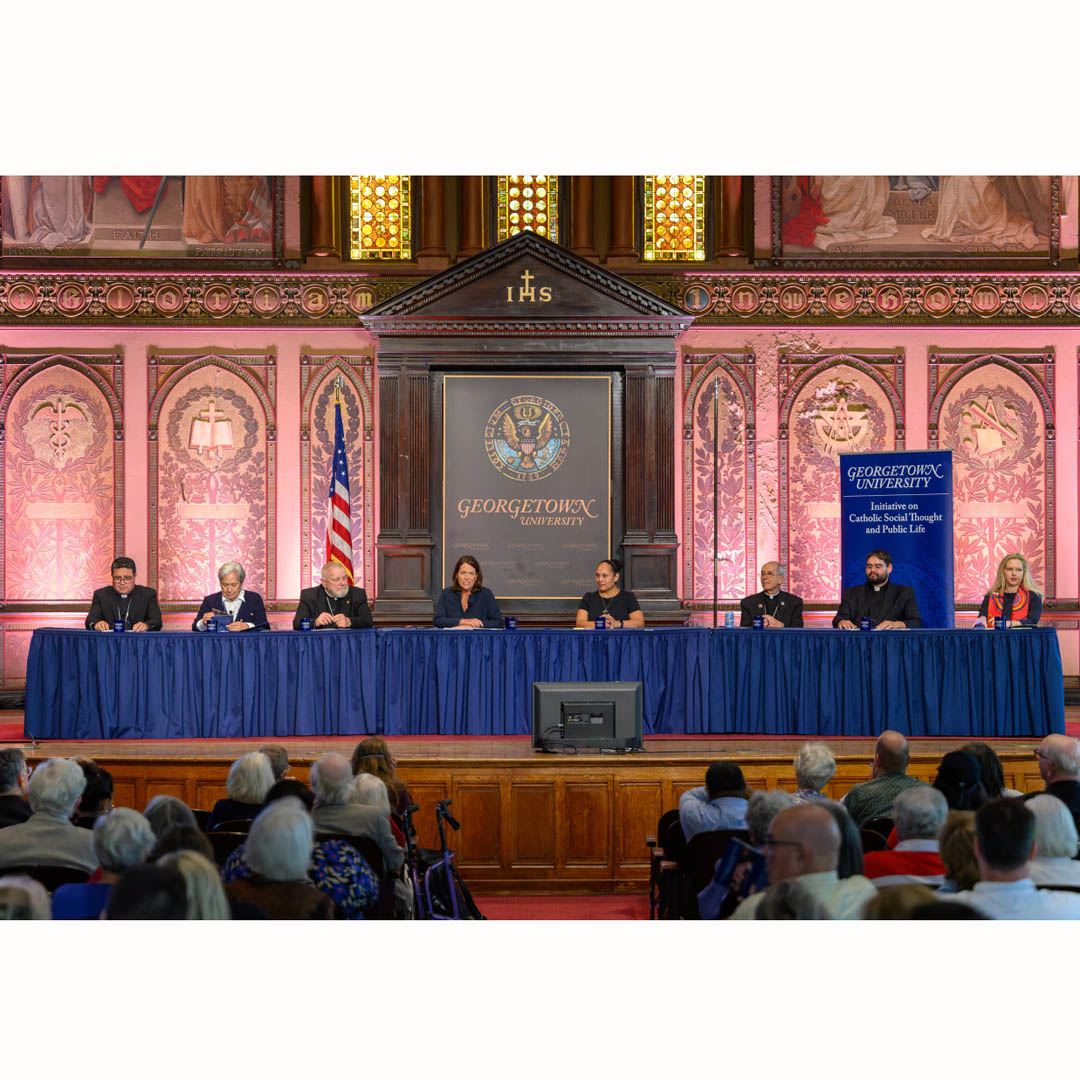By Florida Catholic staff - Florida Catholic
WASHINGTON, D.C.| Archbishop Thomas Wenski joined U.S. Catholic leaders at a Georgetown University roundtable on immigration titled “Deportations and Assaults on Human Dignity.” The event, hosted by the Initiative on Catholic Social Thought and Public Life, drew more than 4,000 viewers in person and via YouTube livestream.
Kim Daniels, director of Georgetown’s Initiative on Catholic Social Thought and Public Life, moderated the panel. Before opening the Sept. 11, 2025, discussion, she called the assembly to prayer.
“That’s one way we can stand in solidarity together: by praying together,” Daniels said.
Leading the conversation, she elaborated on how current immigration policies and enforcement, often through deportation, are affecting not only the daily lives of those being persecuted, but also the communities where they live, work, and worship.
“Throughout these situations, parishes and communities have found ways to support one another, financially, spiritually, providing physical safety, and by reminding one another that Christ is in the boat in the middle of the storm,” Daniels said.
Participants in the panel had all encountered the immigration crisis in the communities where they serve, and they have repeatedly responded in defense of immigrants in their dioceses and ministries.
In addition to Archbishop Wenski, the roundtable included: Archbishop José Gomez of the Archdiocese of Los Angeles; Auxiliary Bishop Evelio Menjivar-Ayala of the Archdiocese of Washington; Bishop Mark Seitz of the Diocese of El Paso, Texas; Father Guillermo Treviño, Jr. of the Diocese of Davenport, Iowa; Sister Norma Pimentel, executive director of Catholic Charities of the Rio Grande Valley, Texas; Ashley Feasley, Legal Expert in Residence at the Immigration Law and Policy Initiative at the Catholic University of America’s Columbus School of Law; and Nichole Flores, associate professor of religious studies at the University of Virginia.

Photographer: COURTESY PHOTO| Georgetown University
Archbishop Thomas Wenski was invited to participate in a roundtable hosted by Georgetown University, in Washington, D.C., on Sept. 11, 2025 on "Deportations and Assaults on Human Dignity: on Catholic Principles, Human Costs, and Pastoral Challenges. In the photo, from left to right, is Archbishop Jose Gomez, Bishop Evelio Menjivar-Ayala, Sister Norma Pimentel, MJ, Archbishop Thomas Wenski, Kim Daniels, Nichole Flores, Bishop Mark Seitz, Father Guillermo Treviño, and Ashley Feasley.
Among the bishops present, Archbishop Wenski was highlighted for his years of service in ministry to the care of migrants and refugees in South Florida. The audience applauded him for praying outside the “Alligator Alcatraz” detention center, in the Florida Everglades, with the Knights of Columbus’ Knights on Bikes, on July 20, 2025.
“Not something you often see, people showing up on motorcycles to say the rosary, but it’s important,” said Daniels. She explained that the archbishop was instrumental in advocating for the rights of detained people to receive access to chaplains and the sacraments in Alligator Alcatraz.
Archbishop Wenski said Mass is about human dignity, and the ability to pray is what sets humans apart from the rest of creation.
“The fact that we invite these detainees to pray, even in this very dehumanizing situation, is a way of emphasizing and evoking their dignity,” said Archbishop Wenski. “It is also a way of telling them that they are not alone and that they are not forgotten. More importantly, that God has not forgotten them and that God is with them.”
As the Virgin Mary stood by Jesus at the foot of the cross, so too, will the Church stand by those detained and those who suffer, he added.
Archbishop Wenski recalled a trip he made 24 years ago with Bishop Nicholas DiMarzio, consultant of Committee on Migration of the U.S. Conference of Catholic Bishops, to visit Commissioner James Ziglar, the head of Immigration and Naturalization Services, in Washington, D.C. At the time, Mexico’s President Vicente Fox addressed Congress to advocate for immigration reform. When the archbishops visited Ziglar, he made it clear that they would fix the immigration issues within the year. A few days later, the terrorist attacks of Sept. 11, 2001, ended that possibility.
“Ever since the World Trade Center, America has been in a bad mood,” Archbishop Wenski said.

Photographer: COURTESY PHOTO| Georgetown University
Archbishop Thomas Wenski speaks during a roundtable hosted by Georgetown University, in Washington, D.C., on Sept. 11, 2025 on "Deportations and Assaults on Human Dignity: on Catholic Principles, Human Costs, and Pastoral Challenges.
Furthermore, “Our immigration programs have been reinterpreted as a problem of national security. And so, we’re afraid of terrorists infiltrating us by coming across the border illegally.”
Fear, he explained, has paralyzed progress that could find a solution to regulate legal migration into the U.S., and also to legalize migrants who have resided in the U.S. for years. For decades, immigrants have entered the U.S. and significantly contributed to the labor force working in agriculture, construction, health care, and the service industry.
“People are coming because they have been attracted by something. There’s something that’s pulling them here,” said Archbishop Wenski.
Unfortunately, current laws and an overwhelmed system cannot help legalize them, or the current influx. To note, the last update to the registry, which is a provision of immigration law that allows for individuals to apply for lawful permanent residency, or a “green card,” was made in 1986. The current registry date within that update is applicable to immigrants who have continuously resided in the U.S. before Jan. 1, 1972.
“We have a problem in which we have people being broken by the law and not breaking the law so much,” Archbishop Wenski said. “Now, if you can just update that date to Jan. 1, 2000, or 2015, or even be generous and say 2026, you would solve all of the immigration issues of what we’re talking about."
Regarding deportation, the archbishop believes the approach is inadequate as it plays into fear and is an unfortunate part of enforcing immigration policies.
“The Administration can say that they are enforcing the laws, and they are,” said Archbishop Wenski. “They are enforcing the laws, laws that are inadequate and antiquated. The laws have to be changed. And laws are made and changed by Congress. So, each of us have to work with our Congresspeople and get them to have a little bit more courage. We have to rationalize it, and humanize it.”
He explained that Catholic social teaching can be used as a powerful tool in understanding and helping the immigrant community, and it can be summarized in one phrase: “No man, no human person, is a problem.”
“To reduce a human person to a problem is to offend their dignity. It’s to go against their dignity as a child of God,” Archbishop Wenski said.
Just as the unborn child, the man on death row or the elderly should all be supported and treated with respect, so too should the immigrant.
“The immigrant is not a problem. Might be a stranger. But a stranger that should be welcomed as a brother or sister,” Archbishop Wenski said.
To watch the full panel, click here.

